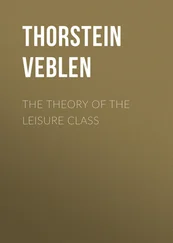It is with less confidence that any student of these modern cultures can test his case by evidence drawn from existing or historical communities living on the savage or lower barbarian plane and not closely related, racially, to the peoples of Western Europe. The discrepancies in such a case are of two kinds: (a) The racial type, and therefore the spiritual (instinctive) make-up of these alien savages or barbarians, is not the same as that of the modern Europeans; hence the culture worked out under the control of their somewhat different endowment of instincts should come to a different result, particularly since any such racial discrepancy in the matter of instincts should be expected to work cumulatively to a different cultural outcome. These alien communities of the lower cultures can therefore not be accepted off-hand as representing an earlier phase of Occidental civilisation. This infirmity attaches to any recourse to an existing savage or barbarian community for object-lessons to illustrate the working of European human nature in similarly primitive circumstances, in the degree in which the community in question may be remote from the Europeans in point of racial type; which reduces itself to a difficult question as to the point in the family-tree of the races of man from which the two contrasted races have diverged, and of the number, character, and magnitude of the racial mutations that may have intervened between the presumed point of divergence and the existing racial types so contrasted. (b) It is commonly said, and it is presumably true enough, that all known communities on the lower levels of culture are far from a state of primitive savagery; that they are not to be taken as genuinely archaic, but are the result either of a comparatively late reversion, under special circumstances, from a past higher stage, or they are peoples which have undergone so protracted an experience in savagery that their present state is one of extreme sophistification in all “the beastly devices of the heathen,” rather than substantially an early or archaic type of culture, such as would have marked a transient stage in the development of those peoples that have attained civilised life.
No doubt there is some substance to these objections, but they contain rather a modicum of truth than an inclusive presentation of the facts relevant to the case. As to (a), the races of man are, after all, more alike than unlike, and the evidence drawn from the experience of any one racial stock or mixture is not to be disregarded as having no significance for the probable course of things experienced by any other racial stock during a corresponding interval in its life-history. Yet there is doubtless a wide and debatable margin of error to be allowed for in the use of all evidence of this class. As to (b), by virtue of the stability of racial types the populations of existing communities of the lower cultures should be today what they were at the outset, in respect of the most substantial factor in their present situation, their spiritual (instinctive) make-up; and this unaltered complement of instincts should, under similar circumstances and with a moderate allowance of time, work out substantially the same general run of cultural results whether the resulting phase of culture were reached by approach from a near and untroubled beginning or by regression from a “higher plane.” So that the existing communities of savages or lower barbarians should present a passably competent object lesson in archaic savagery and barbarism whether their past has been higher, lower, or simply more of the same.
All this, of course, assumes the stability of racial types. But since, tacitly, that assumption is habitually made by ethnologists, all that calls for apology or explanation here is the avowal of it. The greater proportion of ethnological generalisations on this range of questions would be quite impotent without that assumption as their major premise. What has not commonly been assumed or admitted, except by subconscious implication, is the necessary corollary that these stable types with which ethnologists and anthropologists busy themselves must have arisen by mutation from previously existing types, rather than by a long continued and divergent accumulation of insensible variations. A result of avowing such a view of the genesis of races will be that the various races cannot be regarded as being all of the same date and racial maturity, or of the same significance for any discussion bearing on the higher cultures. The races engaged in the Western culture will presumably be found to be of relatively late date, as having arisen out of relatively late mutational departures, as rated in terms of the aggregate life history of mankind. Presumably also many of the other races will be found to be somewhat widely out of touch with the members of this Occidental aggregation of racial stocks; some more, others less remotely related to them, according as their mutational pedigree may be found to indicate.
An advantage derivable from such an avowal of the stability of types, as against its covert assumption and overt disavowal, is that it enables the student to look for the beginning, in time and space, of any given racial stock with which his inquiry is concerned, and to handle it as a unit throughout its life-history.
In all probability each of the leading racial stocks of Europe began its life-history on what would currently be accounted a low level of savagery.
And yet this phase of savagery, whatever it may have been like, will have been removed from the first beginnings of human culture by a long series of thousands of years. That such was the case, for instance, with the European blond is scarcely to be questioned; 68and it is at least highly probable that the other stocks now associated with the blond, though probably older, must also have come into being relatively late in the life-history of the species.
Vague as this dating may be, it signifies that the initial phase in the life-history of at least one, and presumably of all, of the leading races of Europe falls in a savage culture of a relatively advanced kind as compared with the rudest human beginnings. Therefore when these stocks began life, and so were required to make good their survival, the selective conditions imposed on them, and to which they were required to conform on pain of extinction, were the conditions of a savage culture which had already made some appreciable advance in the arts of life. They had not to meet brute nature in the helpless nakedness of those remote ancestors in whom humanity first began. Mutationally speaking, the stock was born to the use of tools and to the facile mastery of a relatively advanced technology.
And conversely it is a fair inference that these stocks that have peopled Europe would have been unfit to survive if they had come into the world before some appreciable advance in technology had been made. That is to say, these stocks could not by native gift have been fit for a wild life, in the unqualified sense of the term; nor have they ever lived a life of nature in any such sense. They came into the savage world after the race had lived through many thousand years of technological experience and (presumably) many successive mutational alterations of racial type, and they were fitted to the exigencies of the savage world into which they came rather than those of any earlier phase of savagery. The youngest of them, the latest mutant, emerged in early neolithic times, and since he eminently made good his fitness to survive under those conditions he presumably emerged with such an endowment of traits, physical and spiritual, as those conditions called for; and also presumably with no appreciable burden of aptitudes, propensities, instincts, capacities that would be disserviceable, or perhaps even that would be wholly unserviceable, in the circumstances in which he was placed. And since the other racial elements of the European population, at least the two main ones, do not differ at all radically from the blond in their native capacities, it is likewise to be presumed that they also emerged from a mutation under circumstances of culture, and especially of technology, not radically different in degree from those that first surrounded the blond.
Читать дальше












